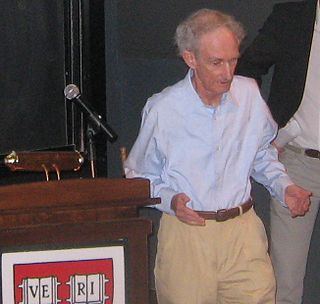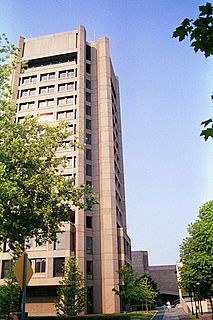Related Research Articles

Robert McCredie May, Baron May of Oxford, HonFAIB was an Australian scientist who was Chief Scientific Adviser to the UK Government, President of the Royal Society, and a professor at the University of Sydney and Princeton University. He held joint professorships at the University of Oxford and Imperial College London. He was also a crossbench member of the House of Lords from 2001 until his retirement in 2017.
Hao Wang was a Chinese-American logician, philosopher, mathematician, and commentator on Kurt Gödel.
Graeme William Walter Barker, is a British archaeologist, notable for his work on the Italian Bronze Age, the Roman occupation of Libya, and landscape archaeology.

Sir Harrie Stewart Wilson Massey was an Australian mathematical physicist who worked primarily in the fields of atomic and atmospheric physics.
Geoffrey Alan Hosking is a British historian of Russia and the Soviet Union and formerly Leverhulme Research Professor of Russian History at the School of Slavonic and East European Studies (SSEES) at University College, London. He also co-founded Nightline.
Philip N. Johnson-Laird is a philosopher of language and reasoning. He was a professor at Princeton University's Department of Psychology, as well as the author of several notable books on human cognition and the psychology of reasoning.

Sir Bernard Walter Silverman, is a British statistician and Anglican clergyman. He was Master of St Peter's College, Oxford, from 1 October 2003 to 31 December 2009. He is a member of the Statistics Department at Oxford University, and is also attached to the Wellcome Trust Centre for Human Genetics, the Smith School of Enterprise and the Environment, and the Oxford-Man Institute of Quantitative Finance. He has been a member of the Council of Oxford University and of the Council of the Royal Society. He was briefly President of the Royal Statistical Society in January 2010, a position from which he stood down upon announcement of his appointment as Chief Scientific Advisor to the Home Office. He was awarded a Knighthood in the 2018 New Years Honours List, "For public service and services to Science".
Henry Keith Moffatt, FRS FRSE is a Scottish mathematician with research interests in the field of fluid dynamics, particularly magnetohydrodynamics and the theory of turbulence. He was Professor of Mathematical Physics at the University of Cambridge from 1980 to 2002.

Leonard Christopher Gordon Rogers is a mathematician working in probability theory and quantitative finance. He is Emeritus Professor of Statistical Science in the Statistical Laboratory, University of Cambridge.

Andrew Joseph Majda was an American mathematician and the Morse Professor of Arts and Sciences at the Courant Institute of Mathematical Sciences of New York University. He was known for his theoretical contributions to partial differential equations as well as his applied contributions to diverse areas including shock waves, combustion, incompressible flow, vortex dynamics, and atmospheric sciences. Majda was listed as an ISI highly cited researcher in mathematics.

The position of Savilian Professor of Geometry was established at the University of Oxford in 1619. It was founded by Sir Henry Savile, a mathematician and classical scholar who was Warden of Merton College, Oxford, and Provost of Eton College, reacting to what has been described by one 20th-century mathematician as "the wretched state of mathematical studies in England" at that time. He appointed Henry Briggs as the first professor. Edward Titchmarsh said when applying that he was not prepared to lecture on geometry, and the requirement was removed from the duties of the post to enable his appointment, although the title of the chair was not changed. The two Savilian chairs have been linked with professorial fellowships at New College, Oxford, since the late 19th century. Before then, for over 175 years until the middle of the 19th century, the geometry professors had an official residence adjoining the college in New College Lane.
Riccardo Rebonato is Professor of Finance at EDHEC Business School and EDHEC-Risk Institute, Scientific Director of the EDHEC Risk Climate Impact Institute (ERCII), and author of journal articles and books on Mathematical Finance, covering derivatives pricing, risk management, asset allocation and climate change. Prior to this, he was Global Head of Rates and FX Analytics at PIMCO.
Ann Patricia "Pat" Fothergill was a pioneer in robotics and robot control languages in the AI department of the University of Edinburgh. She moved to the University of Aberdeen in 1986 to join the Department of Computing as a senior lecturer, where she remained until her death.

Academic ranks in the United Kingdom are the titles, relative importance and power of employees in universities. In general the country has three academic career pathways: one focused on research one on teaching, and one that combines the two.

John Michael Tutill Thompson, born on 7 June 1937 in Cottingham, England, is an Honorary Fellow in the Department of Applied Mathematics and Theoretical Physics at the University of Cambridge. He is married with two children.

Andrew William Woods is BP Professor at the University of Cambridge and a professorial fellow of St John's College, Cambridge.

The Princeton University Department of Mathematics is an academic department at Princeton University. Founded in 1760, the department has trained some of the world's most renowned and internationally recognized scholars of mathematics. Notable individuals affiliated with the department include John Nash, former faculty member and winner of the 1994 Nobel Memorial Prize in Economic Sciences; Alan Turing, who received his doctorate from the department; and Albert Einstein who frequently gave lectures at Princeton and had an office in the building. Fields Medallists associated with the department include Manjul Bhargava, Charles Fefferman, Gerd Faltings, Michael Freedman, Elon Lindenstrauss, Andrei Okounkov, Terence Tao, William Thurston, Akshay Venkatesh, and Edward Witten. Many other Princeton mathematicians are noteworthy, including Ralph Fox, Donald C. Spencer, John R. Stallings, Norman Steenrod, John Tate, John Tukey, Arthur Wightman, and Andrew Wiles.
William Loudon Mollison was a Scottish mathematician and academic. From 1915 to 1929, he was Master of Clare College, Cambridge.

Jean-Marc Vanden-Broeck is a UK mathematician of Belgian origin. He is a Professor of Applied Mathematics at the University College, London.